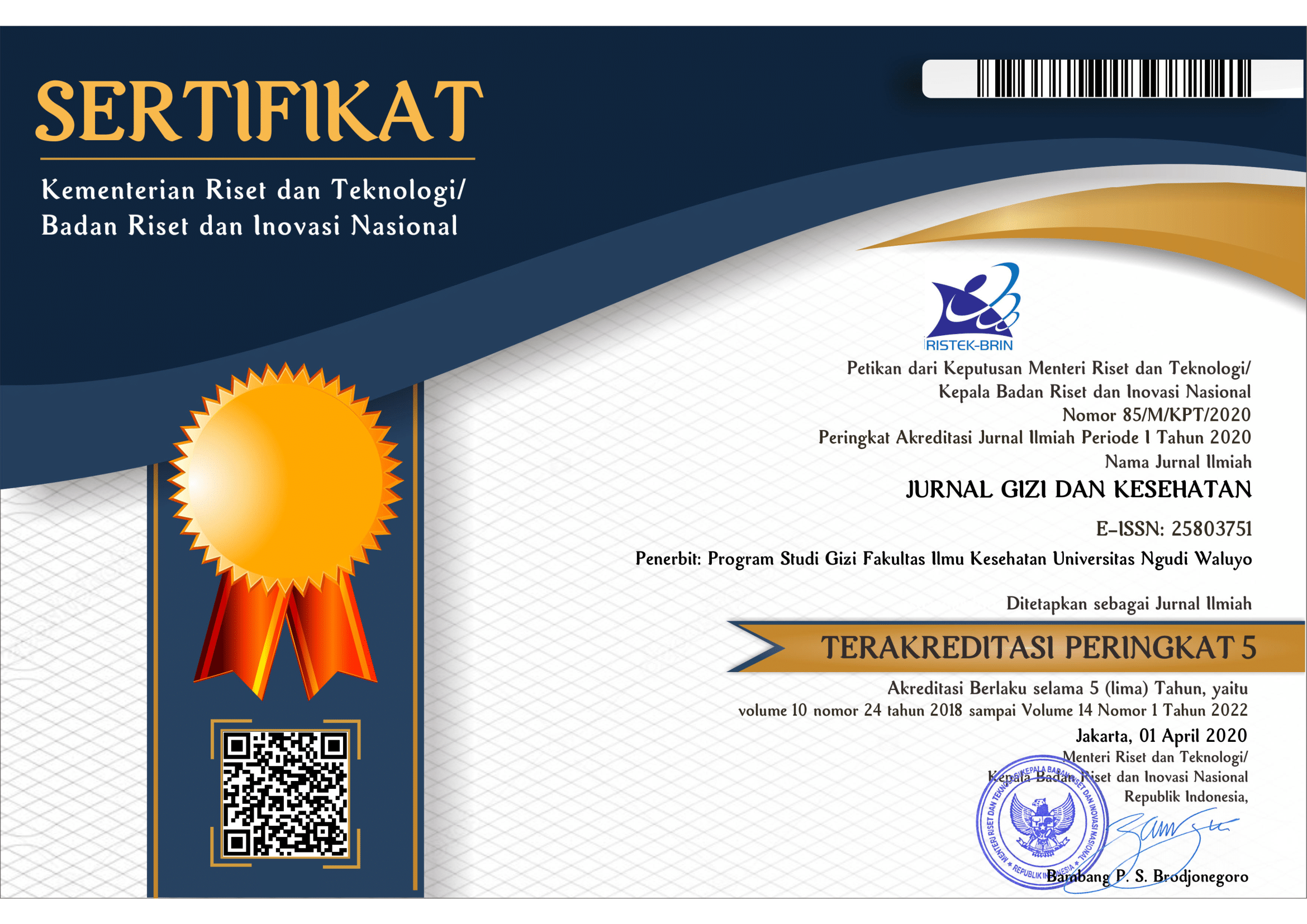Studi Randomized Clinical Trial (RCT) Terapi Gizi pada Anak dengan ADHD: Literature Review
Randomized Clinical Trial (RCT) Study of Nutrition Therapy in Children With ADHD: Literature Review
DOI:
https://doi.org/10.35473/jgk.v16i2.581Abstract
Attention-Deficit/Hyperactivity Disorder (ADHD) is a neurological behavioral problem seen in children, associated with learning disorders, impulsive behavior, hyperactivity, and inability to concentrate. Global Burden of Disease data in 2019 shows that the highest prevalence of children with ADHD aged 10-14 years is 2.9%. Adjusting diet and nutrition is a consideration to improve ADHD symptoms. This literature review aims to determine macro and micronutrients that have benefits in nutritional therapy for children with ADHD based on the results of RCT studies. The review was carried out by searching the literature on the PubMed database with the keywords "Nutrition Therapy", "ADHD", and "children". The results of the literature search obtained a total of 305 articles in the database, and 4 articles met the review criteria. The results of the literature review show that the macronutrient essential fatty acids (EPA) at a dose of 1.2 g is useful for nutritional therapy in children aged 6-18 years with ADHD through cognitive improvement. Micronutrients vitamin D3 2000 IU/day and magnesium 6 mg/kg BW/day can improve behavioral function and mental health and increase serum 25(OH)D levels in children with ADHD. Macronutrient (EPA) and micronutrient (vitamin D and magnesium) interventions in the form of supplementation play a role in reducing ADHD symptoms based on RCT studies.
ABSTRAK
Attention-Deficit/Hiperactivity Disorder (ADHD) merupakan masalah perilaku terkait dengan saraf yang terlihat pada anak-anak, berkaitan dengan gangguan belajar, perilaku impulsif, hiperaktivitas dan tidak dapat memusatkan perhatian. Data Global Burden of Disease tahun 2019 menunjukkan prevalensi anak dengan ADHD paling tinggi usia 10-14 tahun sebesar 2,9%. Pengaturan pola makan dan gizi menjadi pertimbangan untuk memperbaiki gejala ADHD. Tujuan literature review ini untuk menentukan zat gizi makro dan mikro yang mempunyai manfaat dalam terapi gizi anak dengan ADHD berdasarkan hasil studi RCT. Review dilakukan dengan penelusuran literature pada database PubMed dengan kata kunci “Nutrition Therapy”, “ADHD”, “children”. Hasil penelusuran literature memperoleh sejumlah 305 artikel pada database, dan yang memenuhi kriteria review sejumlah 4 artikel. Hasil literature review menunjukkan bahwa zat gizi makro asam lemak esensial (EPA) dosis 1,2 g bermanfaat untuk terapi gizi pada anak usia 6-18 tahun dengan ADHD melalui perbaikan kognitif. Zat gizi mikro vitamin D3 2000 IU/hari dan magnesium 6 mg/kg BB/hari dapat memperbaiki fungsi perilaku dan kesehatan mental serta meningkatkan kadar 25(OH)D serum pada anak dengan ADHD. Intervensi zat gizi makro (EPA) dan zat gizi mikro (vitamin D dan magnesium) dalam bentuk suplementasi berperan dalam mengurangi gejala ADHD berdasarkan studi RCT.
Downloads
References
Banaschewski, T., Belsham, B., Bloch, M.H., Ferrin, M., Johnson, M., Kustow, J., Robinson, S., Zuddas, A., 2018. Supplementation with polyunsaturated fatty acids (PUFAs) in the management of attention deficit hyperactivity disorder (ADHD). Nutr Health 24, 279–284. https://doi.org/10.1177/0260106018772170
Chang, J.P.C., Su, K.P., 2020. Nutritional Neuroscience as Mainstream of Psychiatry: The Evidence-Based Treatment Guidelines for Using Omega-3 Fatty Acids as a New Treatment for Psychiatric Disorders in Children and Adolescents. Clinical Psychopharmacology and Neuroscience. https://doi.org/10.9758/CPN.2020.18.4.469
Chang, J.P.C., Su, K.P., Mondelli, V., Satyanarayanan, S.K., Yang, H.T., Chiang, Y.J., Chen, H.T., Pariante, C.M., 2019. High-dose eicosapentaenoic acid (EPA) improves attention and vigilance in children and adolescents with attention deficit hyperactivity disorder (ADHD) and low endogenous EPA levels. Transl Psychiatry 9. https://doi.org/10.1038/s41398-019-0633-0
Cloud, H., 2017. Medical Nutrition Therapy for Intellectual and Developmental Disabilities, in: Kathleen Mahan, L., L. Raymond, J. (Eds.), Krause’s: Food and The Nutrition Care Process. Elsevier, St. Louis, Missouri.
Effatpanah, M., Rezaei, M., Effatpanah, H., Effatpanah, Z., Varkaneh, H.K., Mousavi, S.M., Fatahi, S., Rinaldi, G., Hashemi, R., 2019. Magnesium status and attention deficit hyperactivity disorder (ADHD): A meta-analysis. Psychiatry Res 274, 228–234. https://doi.org/https://doi.org/10.1016/j.psychres.2019.02.043
Fuentes-Albero, M., Martínez-Martínez, M.I., Cauli, O., 2019. Omega-3 long-chain polyunsaturated fatty acids intake in children with attention deficit and hyperactivity disorder. Brain Sci 9. https://doi.org/10.3390/brainsci9050120
Hemamy, M., Pahlavani, N., Amanollahi, A., Islam, S.M.S., McVicar, J., Askari, G., Malekahmadi, M., 2021. The effect of vitamin D and magnesium supplementation on the mental health status of attention-deficit hyperactive children: a randomized controlled trial. BMC Pediatr 21. https://doi.org/10.1186/s12887-021-02631-1
Lange, K.W., Lange, K.M., Nakamura, Y., Reissmann, A., 2023. Nutrition in the Management of ADHD: A Review of Recent Research. Curr Nutr Rep. https://doi.org/10.1007/s13668-023-00487-8
Mirhosseini, H., Maayeshi, N., Hooshmandi, H., Moradkhani, S., Hosseinzadeh, M., 2024. The effect of vitamin D supplementation on the brain mapping and behavioral performance of children with ADHD: a double-blinded randomized controlled trials. Nutr Neurosci 27, 566–576. https://doi.org/10.1080/1028415X.2023.2233752
Mohammadzadeh Honarvar, N., Samadi, M., Seyedi Chimeh, M., Gholami, F., Bahrampour, N., Jalali, M., Effatpanah, M., Yekaninejad, M.S., Abdolahi, M., Chamari, M., 2022. Effect of Vitamin D on Paraxonase-1, Total Antioxidant Capacity, and 8-Isoprostan in Children with Attention Deficit Hyperactivity Disorder. Int J Clin Pract 2022, 4836731. https://doi.org/10.1155/2022/4836731
Naeini, A.A., Fasihi, F., Najafi, M., Ghazvini, M.R., Hasanzadeh, A., 2019. The effects of vitamin D supplementation on ADHD (Attention Deficit Hyperactivity Disorder) in 6–13 year-old students: A randomized, double-blind, placebo-controlled study. Eur J Integr Med 25, 28–33. https://doi.org/https://doi.org/10.1016/j.eujim.2018.10.006
Państwowego, R., Higieny, Z., Konikowska, K., Regulska-Ilow, B., Różańska, D., 2012. The influence of components of diet on the symptoms of ADHD in children.
Pei-Chen Chang, J., 2021. Personalised medicine in child and Adolescent Psychiatry: Focus on omega-3 polyunsaturated fatty acids and ADHD. Brain Behav Immun Health 16. https://doi.org/10.1016/j.bbih.2021.100310
Robberecht, H., Verlaet, A.A.J., Breynaert, A., de Bruyne, T., Hermans, N., 2020. Magnesium, Iron, Zinc, copper and selenium status in attention-deficit/hyperactivity disorder (ADHD). Molecules. https://doi.org/10.3390/molecules25194440
Samadi, M., Gholami, F., Seyedi, M., Jalali, M., Effatpanah, M., Yekaninejad, M.S., Abdolahi, M., Chamari, M., Mohammadzadeh Honarvar, N., 2022. Effect of Vitamin D Supplementation on Inflammatory Biomarkers in School-Aged Children with Attention Deficit Hyperactivity Disorder. Int J Clin Pract 2022. https://doi.org/10.1155/2022/1256408
Skalny, A. V., Mazaletskaya, A.L., Ajsuvakova, O.P., Bjørklund, G., Skalnaya, M.G., Chernova, L.N., Skalny, A.A., Tinkov, A.A., 2020. Magnesium status in children with attention-deficit/hyperactivity disorder and/or autism spectrum disorder. Journal of the Korean Academy of Child and Adolescent Psychiatry 31, 41–45. https://doi.org/10.5765/jkacap.190036
UNICEF, 2021. THE STATE OF THE WORLD’S CHILDREN 2021 ON MY MIND: Promoting, protecting and caring for children’s mental health. New York.
UNICEF Indonesia, 2023. Key issues for children with disabilities in Indonesia. Jakarta.
Wang, L.J., Yu, Y.H., Fu, M.L., Yeh, W.T., Hsu, J.L., Yang, Y.H., Yang, H.T., Huang, S.Y., Wei, I.L., Chen, W.J., Chiang, B.L., Pan, W.H., 2019. Dietary profiles, nutritional biochemistry status, and attention-deficit/hyperactivity disorder: Path analysis for a case-control study. J Clin Med 8. https://doi.org/10.3390/jcm8050709
WHO, UNICEF, 2023. Global report on children with developmental disabilities: From the margins to the mainstream. Geneva.









